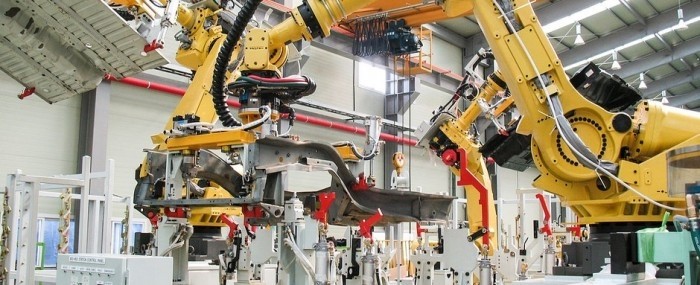
Brazil needs a reindustrialization project that emphasizes Industry 4.0
12 de dezembro de 2017By Elton Alisson | FAPESP Research for Innovation – Brazil urgently needs to implement a reindustrialization project that emphasizes Industry 4.0, in which manufacturing is integrated with big data, artificial intelligence and the Internet of Things, among other technologies, in order to raise the level of automation and as a basis for new ways of organizing production systems.
This view was expressed by participants in the First Brazilian Conference on Industry 4.0, hosted by the São Paulo State Federation of Industry (FIESP) in partnership with the São Paulo State Center for Industry (CIESP), the São Paulo chapter of the National Industrial Apprenticeship Service (SENAI-SP) and the Brazilian Industrial Development Agency (ABDI) on December 5, 2017, in São Paulo.
The purpose of the event, which was attended by representatives of companies and research funding, development and innovation agencies, was to discuss how Brazil can construct competitive advantages in the context of industry 4.0.
According to data presented by José Ricardo Roriz Coelho, Vice President of FIESP and head of its Competitiveness & Technology Department, Brazil faces a drastic process of deindustrialization in the sense that its industrial capacity is declining fairly fast.
Brazilian industry’s share of global industry has fallen by almost half in the last 20 years, from 3.47% in 1995 to 1.84% in 2016, he noted. Its contribution to gross domestic product (GDP) this year was 11.1%, the same as in 1953.
“The industrial sector’s share of GDP in Brazil has shrunk back to what it was 65 years ago,” he said. “As a result, productivity has stagnated.”
Industrialization was the driver of rising productivity for a long period, he explained, enabling Brazil to catch up with the United States to some extent on this front.
In 1980, when industry accounted for 20.2% of GDP, productivity in Brazil reached 40.3% of productivity in the US. In 2015, however, it was 24.9% on the same basis, returning to the level seen in 1950.
“With the fall in industry’s share of GDP in Brazil, productivity compared with the US has also receded almost 65 years. This is a major cause of concern,” he said.
While Brazil has undergone an increasingly profound deindustrialization process, high- and medium-technology economies such as the US, Germany, Japan and China have invested heavily to accelerate migration to Industry 4.0, Roriz continued.
A 2016 survey by PwC covering 2,000 companies in 26 countries forecast annual investment of US$907 billion in Industry 4.0 by 2020. This sum corresponded to 5% of their revenue, but the firms said they expected to cut operating costs by US$421 billion and boost revenue by US$493 billion per year.
Europe, for example, plans to invest €1.35 trillion in Industry 4.0 over the next 15 years, with German firms contributing €250 billion.
China plans to invest €1.8 trillion in the coming years to modernize its industry.
“If Brazil is to compete with these countries, we urgently need a reindustrialization project with emphasis on Industry 4.0,” he said.
Competitive advantages
Brazil has a number of strengths that could help address the challenges posed by the new reality of Industry 4.0, according to participants in the event. These advantages include a diversified industrial base and manufacturing plants operated by leading companies from the main developed countries.
Several obstacles will have to be overcome, however, by improving the technology infrastructure, creating appropriate lines of credit, and developing competencies and capabilities in technologies of key importance to the implementation of Industry 4.0, such as advanced robotics, additive manufacturing (also known as 3D printing), augmented reality and functional materials, the participants noted.
Some of these technologies have already been explored by tech startups as well as universities and research institutions in São Paulo State, noted FAPESP CEO Carlos Américo Pacheco.
“There is a minimal base of competencies relating to advanced manufacturing and the Internet of Things, for example, installed in universities and the business sector. We aren’t starting from scratch in this race,” Pacheco said.
FAPESP’s Innovative Research in Small Business Program (PIPE) has supported a large number of tech startups with projects in areas relating to advanced manufacturing.
Among the more than 200 firms annually supported by the program, 45 are developing projects that focus on advanced manufacturing, according to Pacheco.
“Growing numbers of startups supported by PIPE are interested in developing projects relating to automation, artificial intelligence, photonics, robotics and digitization. And these competencies have been developed in São Paulo State,” he said.
On the other hand, there are new competencies that are more recent and require much more attention in terms of support for projects to develop them, he added. They include augmented reality, 3D printing, and smart or functional materials such as special metals with light weight and high strength, high-performance alloys, advanced ceramics, composites, and polymers.
“We’ve noticed a significant increase in the number of projects supported by PIPE in areas such as the Internet of Things, big data, cloud computing and advanced manufacturing. But these are much more recent developments and deserve more attention,” Pacheco said.
In May 2017, FAPESP issued a call for proposals, open until February 1, 2018, to select firms or consortia that wish to partner with the Foundation in setting up new engineering research centers in advanced manufacturing.
FAPESP’s Board of Trustees recently approved a strategy whereby the institution will support research projects to develop technologies in areas considered critical such as precision agriculture, the Internet of Things and smart cities, aeronautics and space, and advanced manufacturing, Pacheco added.
“We plan to stimulate projects in these areas, which we’ve chosen as priorities, based on consortia involving universities, companies and research institutes,” he said.
Earlier in the year, FAPESP and FINEP, the Brazilian Innovation Agency, issued a call for proposals to support small firms in research to develop innovations in advanced manufacturing. The deadline for submission of proposals was December 11, 2017.
